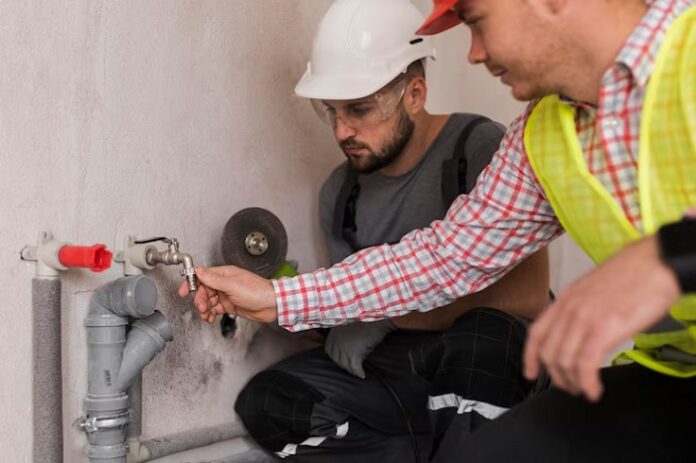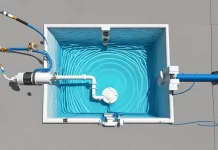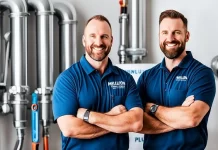Plumbing Emergencies: When Water Goes Rogue
Water is a vital resource, but when it starts seeping through cracks or gushing from burst pipes, it can quickly turn into a plumbing nightmare. Common plumbing emergencies include burst pipes, clogged drains, water leaks, overflowing toilets, and sewage backups. These situations not only cause inconvenience but can also lead to significant property damage if not addressed promptly.
One of the first signs of a plumbing emergency is the presence of standing water or moisture where it shouldn’t be. Other indicators include strange gurgling noises from drains, foul odors, and discolored or murky water. When faced with such scenarios, it’s crucial to take immediate action by shutting off the main water supply to prevent further damage.
| Common Plumbing Emergencies | Signs to Watch Out For |
|---|---|
| Burst Pipes | Water leaks, flooding, low water pressure |
| Clogged Drains | Slow draining, gurgling sounds, foul odors |
| Water Leaks | Damp spots, water stains, mold growth |
| Sewage Backups | Foul odors, discolored water, gurgling toilets |
Electrical Emergencies: When Sparks Fly
Electrical emergencies can be equally daunting and potentially life-threatening. Common scenarios include power outages, sparking outlets, electrical fires, and malfunctioning electrical systems. These situations not only disrupt daily routines but can also pose serious safety risks if not handled properly.
Telltale signs of an electrical emergency include flickering lights, burning smells, sparks or smoke coming from outlets or electrical appliances, and tripped circuit breakers. In such cases, it’s crucial to turn off the main power supply immediately and refrain from using any electrical devices until the issue is resolved.
| Common Electrical Emergencies | Signs to Watch Out For |
|---|---|
| Power Outages | No electricity, tripped circuit breakers |
| Sparking Outlets | Visible sparks, burning smells, discolored outlets |
| Electrical Fires | Smoke, flames, burning odors |
| Malfunctioning Systems | Flickering lights, buzzing sounds, tripped breakers |
Who to Call: The Professionals to the Rescue
When faced with plumbing or electrical emergencies, it’s often advisable to call in the professionals. Attempting to fix these issues yourself, unless you have the necessary expertise, can lead to further complications and even put your safety at risk.
For plumbing emergencies, it’s recommended to contact a licensed and insured professional plumber. These experts have the knowledge, tools, and experience to diagnose and resolve plumbing issues quickly and effectively. They can also provide valuable advice on preventive maintenance and ensure that your plumbing system is up to code.
Similarly, for electrical emergencies, it’s crucial to hire a licensed and insured professional electrician. These professionals are trained to work with electrical systems safely and can identify and rectify any underlying issues, ensuring your electrical system is functioning correctly and up to current safety standards.
Preparing for Emergencies: An Ounce of Prevention
While emergencies can be unpredictable, being prepared can go a long way in minimizing their impact. Creating an emergency plan and assembling an emergency kit are essential steps in ensuring you’re ready to face any plumbing or electrical crisis.
An emergency plan should include contact information for professional service providers, the locations of shut-off valves and circuit breakers, and evacuation routes if necessary. It’s also advisable to have an emergency kit containing essential items such as flashlights, batteries, first-aid supplies, and bottled water.
Preventive Maintenance: Nipping Problems in the Bud
The old adage “prevention is better than cure” rings true when it comes to plumbing and electrical systems. Regular inspections and routine maintenance can help identify potential issues before they escalate into full-blown emergencies.
For plumbing systems, it’s recommended to schedule annual inspections with a professional plumber. They can check for leaks, clogs, and other issues, and provide guidance on necessary repairs or replacements. Additionally, homeowners can perform simple DIY maintenance tasks, such as checking for leaks, cleaning drains, and ensuring proper ventilation in plumbing fixtures.
Electrical systems also require regular maintenance to ensure their safe and efficient operation. It’s advisable to have a professional electrician inspect your electrical system every few years and address any identified issues. Homeowners can also contribute by regularly checking for frayed wires, overloaded circuits, and ensuring proper grounding and insulation.
Safety First: Protecting Yourself and Your Property
Plumbing and electrical emergencies can pose various hazards, including water damage, electrical shocks, and even fires. It’s crucial to prioritize safety throughout the entire process, from the initial response to the resolution of the emergency.
When dealing with plumbing emergencies, exercise caution around standing water, as it can harbor potential health risks and increase the risk of slips and falls. Additionally, be wary of any exposed electrical components that may have come into contact with water, as this can create a dangerous situation.
For electrical emergencies, never attempt to handle electrical components or appliances while standing in water or on a damp surface. Avoid touching any exposed wires or electrical components, and refrain from using electrical devices until the issue has been resolved by a professional.
In some cases, it may be necessary to evacuate the premises if the situation poses an immediate threat to your safety. Always follow the guidance of emergency responders and professionals, and prioritize the well-being of yourself and your loved ones.
Insurance and Damage Mitigation: Protecting Your Investment
Plumbing and electrical emergencies can often result in significant property damage, which can be financially burdensome. Understanding your homeowner’s insurance coverage and taking steps to mitigate further damage can help alleviate some of the stress and financial strain.
Most homeowner’s insurance policies cover certain types of plumbing and electrical emergencies, such as water damage from burst pipes or electrical fires. However, it’s essential to review your policy carefully and understand the limitations and deductibles involved.
To maximize your chances of a successful insurance claim, it’s crucial to document the emergency thoroughly. This includes taking photographs or videos of the damage, keeping receipts for any repairs or temporary accommodations, and maintaining detailed records of the events leading up to and during the emergency.
Additionally, once the immediate emergency has been addressed, it’s important to take steps to mitigate further damage. This may involve hiring professional water extraction or mold remediation services, or engaging in temporary electrical repairs to prevent further issues until permanent solutions can be implemented.
Conclusion
Preparedness is Key
Plumbing and electrical emergencies are an unfortunate reality, but being prepared and knowing who to call and what to do can make a significant difference in minimizing their impact. By following the guidelines outlined in this comprehensive guide, you can navigate these challenging situations with confidence and ensure the safety of your property and loved ones.
Remember, addressing emergencies promptly, hiring licensed and insured professionals, and implementing preventive maintenance measures are crucial steps in mitigating the risks associated with plumbing and electrical emergencies. Stay vigilant, stay prepared, and don’t hesitate to seek professional assistance when needed.
In the words of Benjamin Franklin, “A stitch in time saves nine.” By taking proactive measures and being equipped with the right knowledge, you can tackle plumbing and electrical emergencies head-on, ensuring a safer and more secure home environment.










